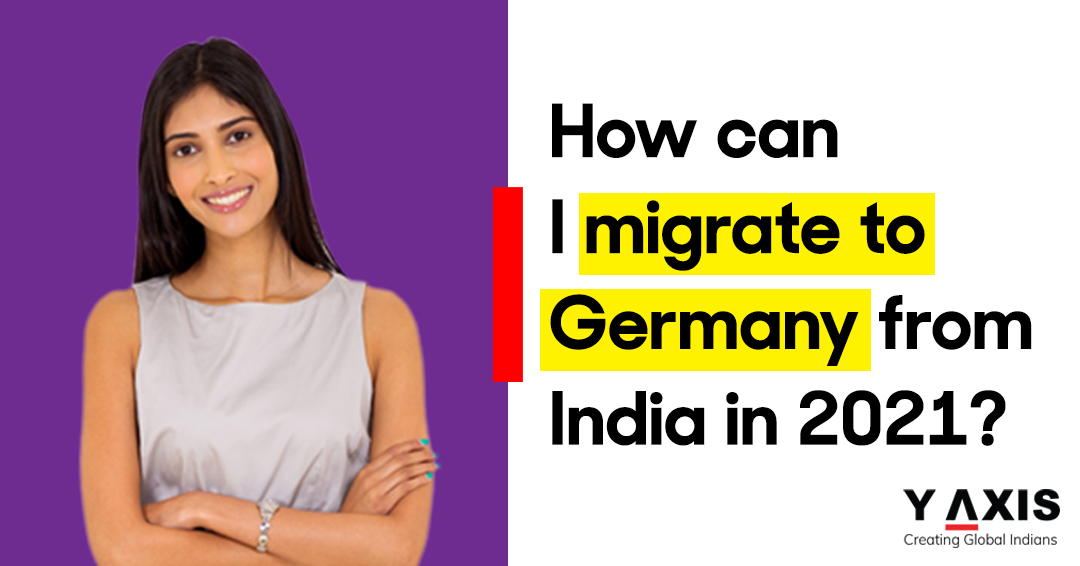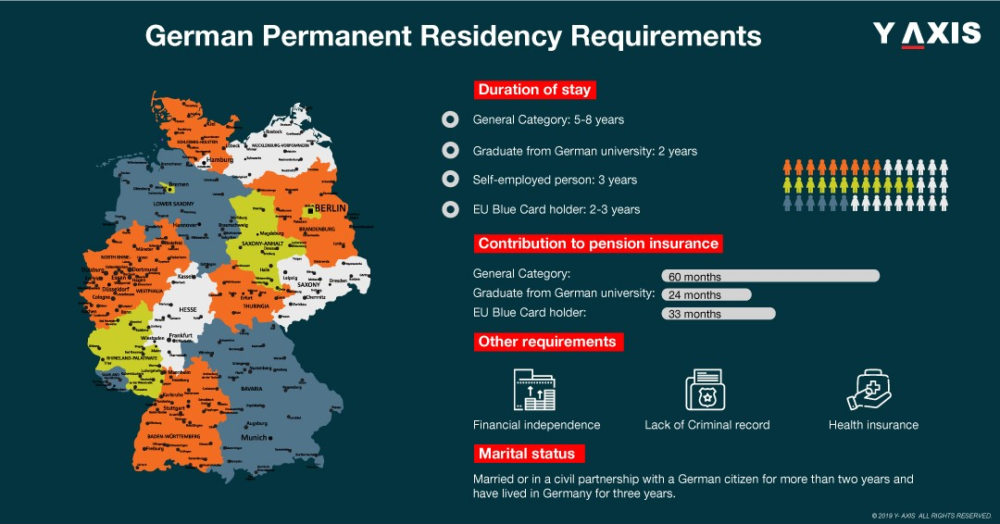
With a safe environment, numerous study and work opportunities, and high-quality medical care, many foreigners want to migrate to Germany. In this post we will decode some of the options available if you want to migrate to Germany from India in 2021.
To migrate to Germany, you will need a valid reason. There are various reasons to move to the country, we will look at some important ones:
- Migrate for employment
- Migrate for education
- Migrate for self- employment
General eligibility requirements
Irrespective of the reason you want to migrate to Germany, there are certain eligibility requirements that you should meet:
Financial stability: Based on the purpose for migration, applicants will have to meet certain financial requirements to prove that they can financially support themselves while in Germany. If you are coming to Germany with a job offer, you still need to have the initial funds to meet expenses till you get your first salary.
Health insurance: It is mandatory to have a health insurance coverage before you migrate to the country. It is better to get the policy from a German company if you are planning to migrate here.
Basic proficiency in German: You will need basic proficiency in German, you will need to give German language test and pass with an A1 or B1 level while a PR visa will need a C1 or C2 level proficiency.
To be allowed to immigrate in Germany, you will need to take the required exams and pass with either A1 or B1 level. If you want to get a permanent residence, you will need a higher proficiency of C1 or C2.
Migrate for employment
If you are migrating to Germany in order to work in the country, here are the work visa options for you.
Work visa for Indians: You must apply for a work visa and a residence permit before you enter Germany. You must approach the German embassy or consulate and submit your application. It must include the following documents:
- Job offer letter from the firm in Germany
- Valid passport
- Annexure for an employment permit
- Certificates of academic qualification
- Certificates of work experience
- Approval letter from the Federal Employment Agency
If you intend to bring your family to Germany when you are working there, the following conditions apply:
- Your income must be enough to support you and your family
- You must be able to provide housing for your family
- Your family members must have a basic understanding of the German language
- Your children must be below 18 years
EU Blue card: You are eligible for the EU blue card if you have a graduate or undergraduate degree from a recognized university and have secured a job with an annual gross salary of 52,000 Euros (as of 2018) in Germany before moving there.
You can get the EU Blue card if you have graduated from a German university or are a highly skilled professional in the field of either mathematics, IT, life sciences or engineering or are a medical professional. Your income must be at a comparable level with German workers.
Jobseeker visa: This visa was approved as per new immigration laws passed by the German government in May 2019. This visa allows skilled workers from other countries to come to Germany and search for a job. This visa was introduced to solve the problem of skills shortage in several areas.
With this visa, you can stay in Germany for six months and look for a job there. The eligibility requirements for this visa are:
- Have at least 5years of work experience in a field related to your study
- Proof of 15 years of regular education
- You must have enough funds for a six-month stay in Germany
- You must show your accommodation proof for the six months
Once you have found a job, you can immediately apply for the EU Blue card or the residence permit. After a few years of successfully staying and working in Germany, you can bring in your family members and even apply for permanent residence.
Job opportunities
Germany has an ageing population and will face a severe skills shortage by 2030. According to demographic studies the working age population (people between 20-64) will come down by 3.9 million by 2030 and by 2060 the number of people of working age will reduce by 10.2 million.
To solve this crisis, the German government is encouraging immigrants with professional qualifications to come not only for work but also train refugees and harness their potential.
It is estimated that 352 out of 801 occupations face a skills shortage at present. The affected sectors are engineering, healthcare and IT sectors. There will be a shortage of skilled workers with a vocational qualification. Occupations that will be impacted by skills shortage include:
- Medical services, engineering (mechanical, automotive, and electrical engineering), software development/programming, supply and waste management, STEM related fields
- Electricians, plumbers, pipe fitters, toolmakers welders, etc.
- Healthcare and elderly care professionals
Jobs will be available in the engineering, mechanical, electrical and IT fields. The healthcare sector will see more demand for nurses and caregivers, owing to the increase in the aging population in the country.
Skilled workers immigration act
The German government passed the Skilled Workers Immigration Act in March 2020.
The German government has estimated that the new act will help to bring 25,000 skilled workers to Germany every year.
Benefits to overseas skilled workers and German employers
With the new act, it will now be possible for German employers to hire skilled workers from overseas who have the required vocational training which is at least two years of vocational training. Till now if employers had to hire such workers, the occupation had to figure in the list of shortage occupations. This prevented the immigration of qualified workers and employers could not hire them. With the act in place, restrictions on hiring overseas workers in shortage occupations will no longer be valid.
Another area where this act will have an impact is the need for skilled workers in the IT sector. Foreign employees looking for work in this sector can apply even if they do not have a university degree or vocational training. The only requirement now will be professional experience in earlier jobs. This experience should be for a minimum of three years which could have been acquired in the last seven years.
Under the Skilled Workers Immigration Act those with a foreign vocational training need not apply for recognition of the training from a recognized German authority. This is a significant shift considering that any foreign worker wanting to work here had to get this recognition. Those with vocational training will now be required to apply for recognition from a single authority, the Central Service Centre for Professional Recognition
Faster processing of residence permit for skilled workers
The German government has also created a new residence permit to help in the recognition of acquired vocational training of immigrant workers. So if you are a skilled worker, you will get your residence permit and can remain in the country. The processing time for residence permits has also been considerably reduced.
Migrate for education
Germany has several universities offering courses in a range of subjects. These universities have minimum tuition fees while some are free of cost. International students can opt for courses in a range of subjects from Engineering, Medicine, Architecture, or Business.
The USP of German universities are a combination of high-quality education with a unique cultural environment and experience. These factors attract many international students to the country.
If you are planning to move to Germany to study there, you must get your visa before moving to the country. The following documents are required for your student visa:
University admission letter-You will need to have print out of the email from the German university confirming your admission.
University Entrance Qualification – Your educational qualification must be on par with the standards of the German education system to get admission to a university there. Otherwise, you will have to attend a preparatory course and take an exam to qualify.
Proof of financial resources “Finanzierungsnachweis”– Indian students wishing to study in German must have a minimum amount (€10,236) as specified by the German government. The blocked account is the most popular way to prove that you have enough funds to study and live in Germany for one year.
Proof of health insurance coverage
Proof of language proficiency
Once you complete you studies you can stay in Germany for a limited period to search for a job. Once you find a job you can apply for an EU Blue Card.
Migrate for self- employment
If you are looking for self-employment opportunities in the country, then you need to apply for a residence permit and permission to start your business. you will need a self-employment visa if you are coming to Germany temporarily and for business purposes.
Before approving your visa, the authorities will check the feasibility of your business idea, review your business plan and your previous experience in business.
They will check if you have the capital to start your business and if your business has the potential to meet economic or regional needs in Germany. If your business is successful you can get unlimited extension for your residence permit.
Pathway to permanent residence
Migration to Germany for work, study or business can be a pathway to permanent residency in the country. You must meet the eligibility requirements to get your PR visa.

There are various ways to migrate to Germany from India in 2021. Choose the option best suited to you and get the process rolling to move to this country.



How can I migrate to Germany from India in 2021?
Posted on December 2, 2020